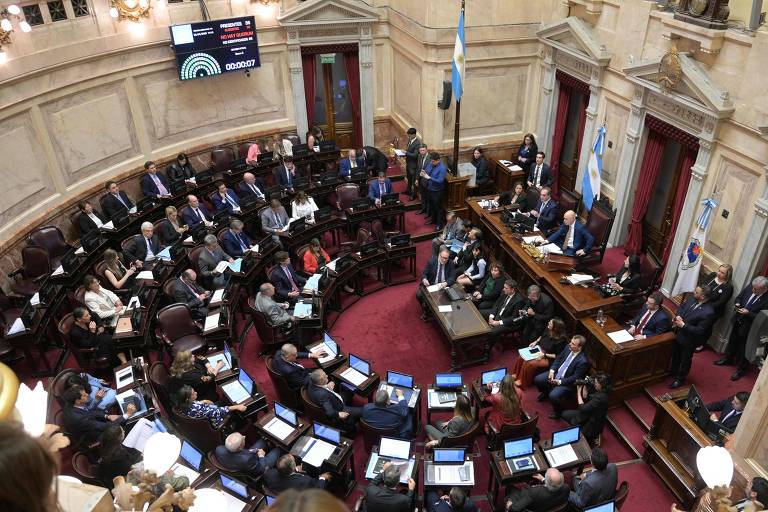
Published 04/04/2025 12:17
The Argentine Senate rejected on Thursday (3) the names nominated by President Javier Milei to the Supreme Court of Justice. Ariel Lijo and Manuel García-Mansilla, chosen by decree in February, did not obtain the two necessary thirds of the house and were defeated by large margin, in a session that opened the government’s political isolation.
Lijo, federal judge accused of paralyzing sensitive investigations, received 43 opposite votes, 27 favorable and 1 abstention. García-Mansilla, a constitutionalist teacher linked to Opus Dei, was rejected by 51 votes to 20. According to the Argentine press, it is the first time since the return of democracy in 1983, which the Senate refuses two presidential nominees for the court.
The defeat was made possible by a wide front between peronists, dissidents of radicalism (UCR) and members of the Pro, party founded by Mauricio Macri. Parliamentarians such as Martín Lousteau, Guadalupe Tagliaferri and Pablo Blanco broke with the government base and ensured the necessary quorum for the vote to occur.
“If we allow judges to be appointed by decree, we will have positions held by employees of the executive, not by magistrates,” warned Lousteau.
Behind the scenes, the setback was interpreted as a direct message from Macri, who would have personally articulated the votes of part of his bench against Milei’s interests. A Senator of Pro told the newspaper Page/12 That “in three years of office, it was the first time that Macri asked me for something explicitly.” The tension between the former president and the current government intensified after disputes for control of the City of Buenos Aires.
Vice President Victoria Villarruel was also the target of attacks. President of the Senate, she authorized the session even after orders from Casa Rosada to suspend it. The libertarian deputy Lilia Lemoine called her “Kukarruel” in a post generated by artificial intelligence. Already Santiago Caputo, strategist of Milei, suggested that the deputy betrayed the government by allowing the session to occur.
“The government tried to streamline the session with unpublished maneuvers, but was even defeated by its own allies,” said Senator Anabel Fernández Sagasti. According to her, the Peronist block now studies asking the college of lawyers to remove Lijo’s enrollment for “immorality.”
In an official statement, the government repudiated the decision and classified the Senate as “refuge of the political caste.” The note states that parliamentarians prioritized “the protection of their own legal proceedings” rather than ensuring the operation of one of the three powers of the Republic. “For the first time in history, presidential nominations were rejected for merely political reasons,” says the text.
During the session, Senator Pablo Goodsusán (UXP) stated that the appointment by decree constituted a “abuse of power.” He recalled that one of the vacancies in the court, that of Judge Elena Highton de Nolasco, occurred in 2021, during the ordinary period of the Senate, which would invalidate the argument of the urgency invoked by the government.
The session was also marked by the failed attempt to include the Clean Record project, which could block candidates such as former President Cristina Kirchner. The text was rejected by 33 votes to 27.
The rejection of the nominations opens a new phase in the institutional dispute in Argentina. In addition to deepening Milei’s isolation in Congress, it strengthens the discussion about a possible expansion of the Court. For opposition sectors, the result reaffirms the role of the Senate as a counterweight to the executive’s authoritarian attacks.
Meanwhile, García-Mansilla-who was already in the court in provisional-can resign, according to UCR parliamentarians. “The executive should first fill the vacancies in the Federal Court before blaming all senators,” said a radical senator. The crisis between powers deepens, and Javier Milei’s libertarian government has suffered its greatest institutional defeat since inauguration.
Source: vermelho.org.br

